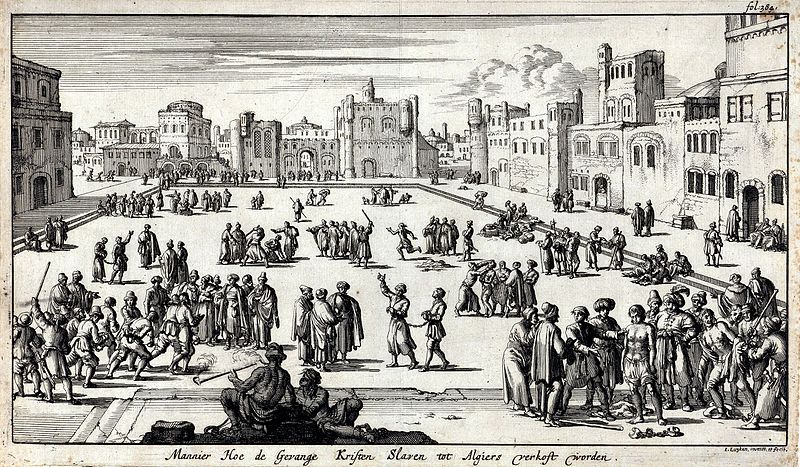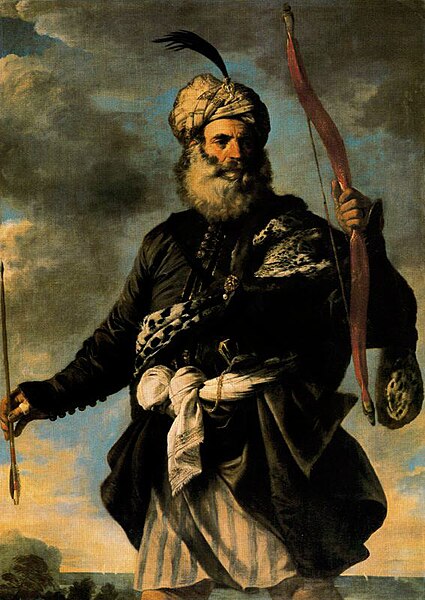Thomas Lurting was an experienced seaman from Liverpool, England who converted to Quakerism while serving on a warship during one of Oliver Cromwell’s wars in the 1650s.
The brand-new Quaker movement hadn’t formally adopted a declaration of pacifism – Quakers were all over the map, some of them refusing to join in wars because of a literal application of the Sermon on the Mount, and others serving in Cromwell’s army and even upbraiding Cromwell for not being righteous enough to achieve more military victories – as Quaker leader George Fox wrote in 1658:
Oliver, hadst thou been faithful and thundered down the deceit, the Hollander had been thy subject and tributary, Germany had given up to have done thy will, and the Spaniard had quivered like a dry leaf wanting the virtue of God, the King of France should have bowed his neck under thee, the Pope should have withered as in winter, the Turk in all his fatness should have smoked, thou shouldst not have stood trifling about small things, but minded the work of the Lord as He began with thee at first … Let thy soldiers go forth… that thou may rock nations as a cradle.
Lurting started out as one of the warlike Quakers, but he switched from the prowar position to the pacifist position in the middle of a battle, deciding that God didn’t want Christians to kill people. So after somehow avoiding a hanging, Lurting left the Navy and continued his seafaring career as a merchant seaman. After the Restoration of the monarchy in the 1660s, the British Navy kept trying to draft (“impress”) Lurting off of his merchant vessels, but he kept refusing to serve, and they let him go rather than endure his inflexible and troublesome conscience.
In the interim, George Fox had switched to a more peaceful tone as he tried (unsuccessfully) to persuade the new royal regime that Quakers were loyal subjects. Far from plotting against the King, Fox and other Quaker leaders insisted, Quakers were, and had always, been, pacifists:
…our weapons are spiritual and not carnal, yet mighty through God to the plucking down of the strongholds of Satan, who is author of wars, fighting, murder, and plots. And our swords are broken until ploughshares and spears into pruning; hooks, as prophesied of in Micah iv. Therefore we cannot learn war any more, neither rise up against nation or kingdom with outward weapons, though you have numbered us among the transgressors and plotters. The Lord knows our innocency herein, and will plead our cause with all men and people upon earth at the day of their judgement, when all men shall have a reward according to their works…
This statement was influential enough to establish pacifism as a norm among Quakers for the time being.
On one of his merchant voyages in the 1660s, Lurting was mate under Captain George Pattison, who was sailing in the southern Mediterranean. Lurting had a premonition that their merchant ship would be captured by Algerian pirates, whom Lurting called “Turks” because of their nominal allegiance to the Muslim Turkish Sultan. Algerian pirates were in the habit of seizing European ships (or even conducting coastal raids) and enslaving Europeans. The captain pooh-poohed this possibility, so as the rules of drama require, they were, in fact, captured by Algerians. Lurting says he was no longer anxious, because he believed God would deliver them all from the “Turks.”
Lurting’s advice to the men was to comply with the Algerines’ demands and satisfy the pirates of their docility, thus lulling them into a false sense of security. Contrary to the wishes of some of the men, Lurting did not want to kill any of the pirates – such a thing would be un-Christian. Indeed, Lurting would rather be a slave in Algiers than be a killer, and he threatened to tell their captors if any of the sailors made any murderous attempt.
Lurting recovered the ship by a ruse, luring the pirates into the ship’s cabins on a rainy night, where the pirates fell into sleep and woke up to find their weapons seized and and in the hands of Lurting and his party (except their concealed daggers, which Lurting wasn’t aware of until later) . Then Pattison and Lurting turned the ship toward the Spanish island of Majorca (or Mallorca).
The Algerians were very unhappy, since the Spanish, if they got hold of the pirates, would enslave them – and these Algerines had signed up as enslavers, not as slaves.
Lurting, perhaps on account of his Quaker beliefs, or perhaps because of his and Pattison’s English abhorrence of turning anyone over to the despised Spaniards, decided to hide the Algerines in the ship while it docked in Majorca. During that time another English captain came over and thought it was stupid not to profit from the sale of such valuable human merchandise, so the other captain dropped a dime (or piece of eight) and told the Spaniards that there were valuable Muslim slaves in Pattison’s ship.
So Pattison, Lurting, the English crew, and the Algerine prisoners slipped away from Majorca.
Pattison and Lurting tricked the Algerines into thinking they were going to Algiers, steering that direction in the daytime but then surreptitiously steering for England at night. When the Algerines found out, they threatened Pattison, and it looked for a while as if the pirates might have the upper hand again. But the English crew, brandishing their weapons, persuaded the Algerines to give up their mutiny and go below. Lurting was pleased that nobody had been killed, though the English crew had only saved the day by threats of deadly force – not consistent with the purest form of pacifism.
Pattison and Lurting, based perhaps on their compassion for the Algerines and/or the desire to be rid of them, decided to drop them on shore near Algiers. Bringing the ship close to shore, Lurting arranged the Algerines in the ship’s boat. Others in the crew wanted to at least tie up the Algerines, but that would be too degrading, Lurting believed. So the English crew stood in the boat with their weapons (and the Algerines’), while having the Algerines sit on each others’ laps while the boat was rowed to shore.
Just before the boat landed, a crew member mistakenly thought he saw armed men in the bushes – this scared Lurting and the others, emboldening the Algerines to try another mutiny. Lurting became a bit less peaceful:
It’s better to strike a Blow, than to cleave a Man’s Head, or cut off an Arm ; and I turned the Hook of the Boat-hook into my Hand…then I struck the Captain [of the Algerines] a smart Blow, and bid him sit down, which he did instantly
Then the English turned the Algerines loose on shore and tossed their weapons over to them. The Algerines invited the English to come with them to a nearby town and have some wine, and Lurting was tempted, but apparently the rest of the crew were not.

“C’mon, guys, come back! Don’t worry that we’re going to get you drunk and then enslave you, because the thought never even crossed our minds.”
So the English went back to their ship and went back to England. And nobody had been killed or enslaved. Maybe it made the pirates think.
Works Consulted
William E. A. Axon, Thomas Lurting: A Liverpool Worthy. Transactions of the Historic Society of Lancashire and Cheshire. For the year 1885 – Volume XXXVII. New Series.-Volume I. Liverpool: Printed for the Society, 1888, 21-28.
Mark G. Hanna, Pirate Nests and the Rise of the British Empire, 1570-1740. Chapel Hill: University of North Carolina Press, 2015.
Thomas Lurting, The Fighting Sailor Turn’d Peaceable Christian: Manifested in the Convincement and Conversion of Thomas Lurting. With a short Relation of many Great Dangers, and wonderful Deliverances, he met withal. First Written for private Satisfaction, and Now Published for general Service. London: Printed and Sold at the Bible in George yard, Lombard-Street, 1766.








Great article.
Did they shout ‘Fuck off, slavers!’ at the end? I really hope so.
^^^
As the staunch papist that you are, how do you feel about Quakers Eddy? They’re a bit nutty in my opinion, but they seem like alright people. They did a pretty good job at running a colony too.
I don’t know, PA probably has the dumbest liquor laws.
Close battle between Quaker state and Mormon state.
South Carolina would like a word.
They got rid of their tiny bottle law, or they might be at the top of the list.
Pennsylvania’s liquor laws are a result of Gifford Pinchot, the governor at the time of the 21st amendments ratification. He was a staunch prohibitionist, and a big standard protestant. His goal when alcohol was legalized again was, and I quote:
Under Quaker rule, Pennsylvania was perfectly fine for alcohol. Until prohibition, we had more distilleries and breweries than any other state. Hell, we tried to overthrow the feds because of alcohol with the whiskey rebellion.
Bronson’s dad?
The Quakers are good people. Staunchly against war. The Founders thought they were decent people too and that’s why they stated that federal office holders should swear and oath or affirm (as the Quakers were not too fond of swearing oaths). There only failing was that they were protestant.
Were there any other presidents that were Quaker besides Nixon?
Yes, Herbert Hoover was a Quaker.
Maybe there should be a religious test keeping Quakers out of office then.
Well, at least the presidency.
mmm… not helping the case.
That is a terrible track record, but the Catholic’s isn’t stunning either.
Leave it to a subject of the ‘commonwealth’ to bash the Catholics. Do you have your effigy of the Pope ready for Guy Fawkes day, if it so pleases the crown?
I remind you, Just Say’n, that when we conquered this fine nation from the French we could have proceeded to have a good ol’ English Protestant pogrom against the Papists, but instead we passed legislation protecting your faith and allowing you to have a great deal of power in Quebec society (which you pissed away like idiots in the 60s).
Also, the Catholic Church of Canada did the smart thing supported their betters in the British Crown.
I just realized the irony of having Chesterton as my picture- a Catholic who also supported the British Crown. His one failing
Monarchism helps to improve the nature of the Papist.
Our Catholic Prime Ministers tended to be great.
Meh, 0-1 isn’t that bad, right? It’s the same record as our black presidents have.
They’re a bit nutty in my opinion
How so (remembering that SP is one and she has the Cat Butt at the ready)?
You’ve never added almonds to your oats?
I’m with Kratman on the subject of most pacifists being moral cowards. Very easy to be pacifistic when you have other people willing to defend your way of life.
/Someone with a family history of military service.
GIMME THAT SWEET, SWEET CAT BUTT.
But don’t Quakers, as a rule, try to convince others to resolve conflicts peacefully? They’re not being pacifist while proposing others go out and fight for their way of life.
In fact, I’d say they’re unashamedly vocal even they know their views will invite ridicule. That’s not cowardice. Especially not in this day and age.
Well, that, and the whole still serving as medics, ambulance drivers, or other non-combat roles.
The military provides roles for non-shooters where they can still contribute to defeating the bad guys (I’m presuming we’re the good guys). In that setting a pacifist can still discharge their moral duty to prevent harm from being done to others.
That’s a pretty unique situation. Outside of the military, an immediate threat to someone rarely occurs in a situation where a pacifist can contribute to ending the threat. Its those situations that make me uncomfortable with pacifism.
While the definition has expanded, I still try to use pacifism in its original meaning of “opposition to war”. Outside of that context, what you describe, I wouldn’t call pacifism as much as Kitty Genovese Syndrome.
Outside of that context, what you describe, I wouldn’t call pacifism as much as Kitty Genovese Syndrome.
Its pretty much what passes for pacifism these days, though. And it also had some currency back in the day, as Mr. Lurting’s adventure shows – he declined to commit any violence even in defense of himself or others, in a non-war setting.
I’m a big fan of using more traditional definitions of words, but I think using “pacifism” to describe a principled anti-war position is probably going to lead to a lot of misunderstanding, since nearly everyone understands it to mean something else.
I’m not addressing Quaker military service, which is fine, more the general philosophical idea of pacifism and how it specifically requires people around it to not be pacifist in order to survive, or else they end up like the Chatham Island tribes.
Some cannot be convinced, and to expect others to conform to that ideal in the long run results in outcomes that would continue to promote injustice and horror. I’m sure Himmler would have appreciated negotiating a peace with a Quaker, the people who would continue to suffer under his rule less so. Unconditional surrender is a vastly more preferable outcome.
I don’t want to convince ISIS that they’re wrong and proceed to live in peace with them, I want them dead because they’re scumbag rapist slavers. If a Quaker wants to go up to an ISIS member and try to negotiate with them, and they take their beatings and torture like Christ himself, that’s respectable. Sitting in a first world country, away from every threat, playing Armchair diplomat and telling them to resolve conflicts peacefully is a little different.
“Very easy to be pacifistic when you have other people willing to defend your way of life. ”
One of the big points of contention in the middle of the 18th century, when Quakers in PA wouldn’t even vote for taxes for defense.
There were other groups (collectively referred to as the German Peace Churches) whose members sometimes died rather than take up arms.
A good chronicle of this in “American Nations”.
I come from a Catholic/Methodist background, so their views are just very different from my early conception of Christianity. Nothing wrong with the views themselves, and I have an easier time understanding where Quakers come from than Mormons or Jehova’s Witnesses.
Keep in mind, I find Baptist to be a bit out there, so it mostly my personal biases at play. ‘Nutty’ was probably a poor word choice.
Might I suggest that all faiths sound nutty to a large number of varying people for numerous different reasons and that we should not judge, lest we be judged?
Probably.
Bingo.
You’re just saying that because you worship a Three-Headed Zombie Carpenter who fought dragons.
Hitting the Molson a little early, it would seem
Actually the dragon part comes later.
I do not worship Karen Carpenter, thank you very much.
Like I said, poor word choice on my part.
True pacificism – won’t commit any violence whatsoever even to defend yourself or others – has struck me not so much as moral cowardice as moral vanity. It seems more important to the pacifist to keep his own hands clean than to prevent evil from being done. A true pacifist, IOW, is willing to allow any atrocity to go forward, as long as their moral purity is unbesmirched.
I get it, that if every single person was a pacifist that the world would be a better place. But every single person is not, and never will be, a pacifist. Pacifism, to me, stinks of utopianism – it requires a denial of human nature to achieve the desired society.
Its one thing it say “I just don’t think I could kill another human being.” For many people, that’s just the way they are, and that’s OK. Pacifism, though, is elevating this inability to a moral imperative, and one that overrides any and all duties to protect other people from violence.
It just leaves a bad taste in my mouth.
Now, Mr. Lurting certainly had the courage of his convictions. But, pursuing his own moral code meant he was putting the other crew members at risk. They escaped the slavers mostly through luck, and he made it much much more unlikely that they would.
And, of course, he turned the slavers loose to commit more crimes.
I have a hard time saying that pacifism, as applied in the real world, is actually more moral than, say, the NAP.
at least it’s an ethos.
I’ve been around Quakers a lot, they’re somewhat less distinctive than in the 17th century. You have your Protestant evangelical Quakers with their hymns and ministers, your SJW “post-Christian” Quakers who impose no theological tests other than voting Democrat, and various Quakers in between.
You got English Quakers, American Quakers, Kenyan Quakers, etc., etc.
Compare and contrast.
Baltimore Yearly Meeting, Friends General Conference:
“We aspire to listen deeply and inclusively to each other, to actively welcome all, and to attend in joy and faith to the Inward Teacher, whom some call Light, some call Spirit, and some call Christ.”
and then there’s this from the Evangelical Friends Church, Mid America:
“We have experienced the coming of the Living Christ in and among us, the foretaste of God’s glorious reign and basis of our hope. At His second coming, Jesus Christ will return in power as King of kings to consummate His rule over individuals and nations by the final triumph over Satan. The dead shall be resurrected, some to eternal life, others to everlasting punishment. All shall be judged by God and receive just recompense for their deeds. The blessed ones shall live forever in heaven, but the lost suffer eternally in hell.”
I think the problem is we ran out of Presbyterians in government.
Well, you know the saying someone came up with to illustrate the lunacy of liberal/proggy positions: “Not giving is taking.”
I was at a meeting today where we were lining up people to go to a townhall to oppose healthcare reform. The person doing the organizing actually said that the Medicaid reform was the greatest wealth transfer from poor people to rich people in our history. They actually took the position, in all seriousness and in public, that not giving is taking.
Where do you work, Google?
Rufus has assured me that none of us actuality work.
Rufus is Canadian. They cannot be trusted
I work in an office.
Does it have padded walls? Or do they use other methods to keep those crazy morherfuckers at bay?
I nod, and smile, and count the days until I don’t need a job. On that day, saying what I really think won’t come out on the short end of a risk/benefit analysis.
Yeh, but probably for (((lawyers)))). *scratches beardy chin*
‘Gonna watch you, boy!‘
Okay, sorry for linking Flatt and Scruggs to try to make a dumb joke. They were brilliant musicians, and don’t deserve to be degraded into retarded memes.
‘brilliant musicians’ is the thing I need to remember, because it’d Goddamn true.
Maybe it made the pirates think.
Or, maybe it let the pirates go back to killing, raping, and enslaving. I know which way I’d bet.
So was Vash the stampede a Quaker?
No Vash legitimately murders someone when the outcome is either the death of his opponent or dozens of others, utilitarianism ends up defeating his idealism.
Yeah but he freaked the fuck out about it. It could be his base instincts kicked in and afterwards he realised how badly he screwed up.
He got over it pretty quickly, isn’t the whole point at the end of that series some kind of Nietzschean “I’ll find my own path and not force myself to follow other people’s strict moral systems” message?
Not a lot of Quakers left in Majorca from what I hear
A bunch of Shakers, though.
PS – how does one get an image on the teaser – you know, the thing that links to the article?
Did you make a donation?
Yes, and I also figured it out myself just now.
Needs MOAR Kraken